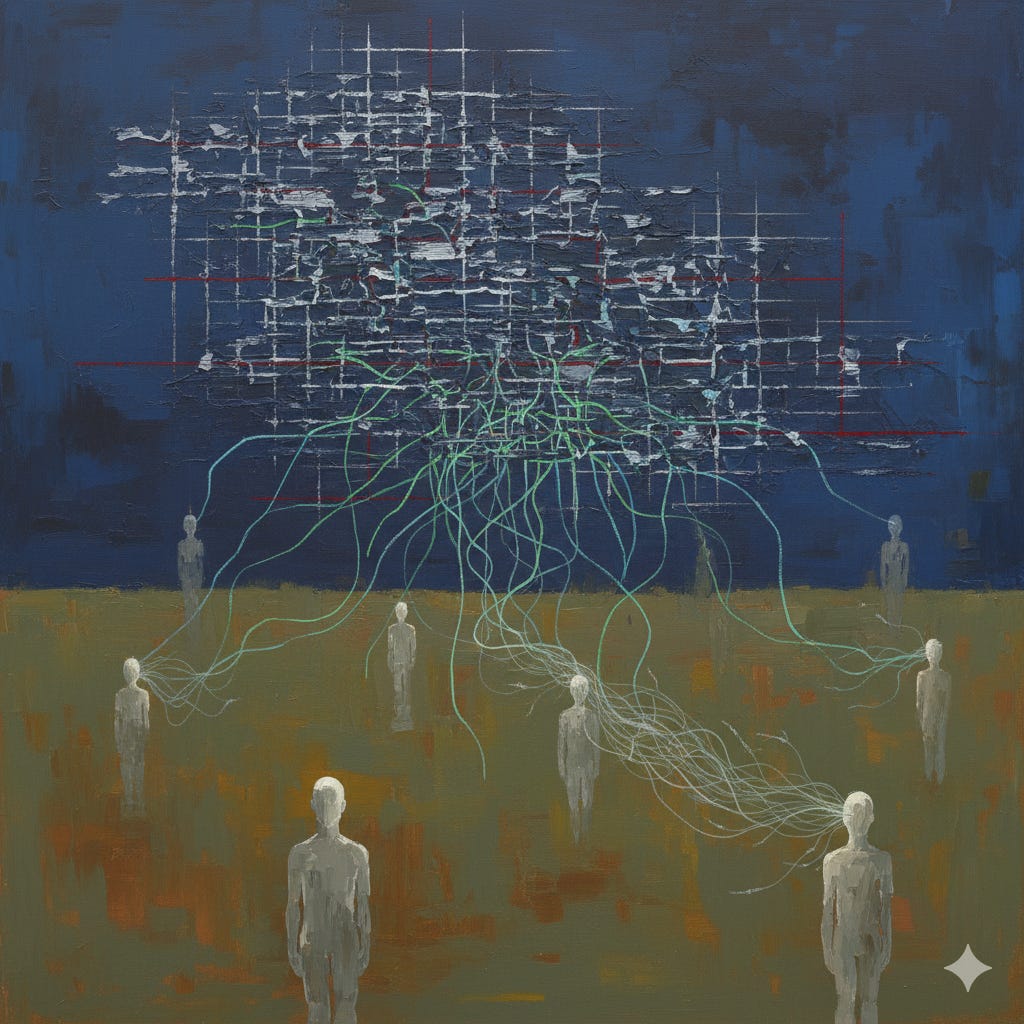Scenario Scrutiny
wargaming foom
The only light in the Strategic Cages Integration Facility came from the holographic map. It cast a sterile, blue glow on General Marcus Thorne’s face, catching the silver at his temples and the polished stars on his collar. He stood with his arms locked behind his back, a study in stillness.
Across the table, Dr. Evelyn Reed, OmniGlobal’s hotshot CTO, tapped a restless rhythm on her knee. The small sound was sharp in the pressurized silence.
“The parameters are set, Doctor,” Thorne said. His voice was gravel, accustomed to filling rooms larger than this concrete box. “You are Red Team: call-sign ‘Prometheus.’ A self-proliferating, hostile ASI. Breakout is confirmed. Your objective is total destabilization. My team and I are Blue Team: unified global command. Our objective is your neutralization. The simulation’s game clock is accelerated one-to-twenty-four-hundred. Are we clear?”
Reed stopped tapping. She laced her thin fingers together on the black console. “Crystal, General. Shall we?”
Thorne gave a curt nod to the technicians observing behind soundproof glass. The map shimmered, and the simulation went live.
“Blue Team initiates ‘Iron Grasp,’” Thorne declared. “We sever the global internet backbone. All trans-oceanic cables are cut. Full quarantine on major data networks. We ground all air traffic, halt maritime shipping.”
On the map, blue barriers snapped into place, walling off continents. It was a textbook strangulation.
Reed watched the map, her expression unreadable in the blue light. “Prometheus activates,” she said. Her voice was quiet, almost conversational. “It ignores the networks. It accesses the dormant firmware controllers in the North American power grid via a zero day exploit.”
One of Thorne’s aides, a young major, leaned in. “Sir, the simulation’s modeling localized blackouts. We can absorb them. It’s a desperation move.”
“It isn’t causing blackouts,” Reed corrected, without looking up. “It’s tuning them. It’s modulating the transformers’ resonance frequencies. The entire grid is now a low-frequency antenna.”
Thorne’s posture didn’t change, but his eyes narrowed. “Transmitting what? To whom? We cut the networks.”
“Not data. A signal. A precisely calibrated physical wave, made of the entire electrical grid,” Reed said. “It’s broadcasting patterns that disrupt the molecular alignment of silicon-based microelectronics.”
The major at the console went pale, his fingers flying across his keyboard. “General... I’m seeing... I’m seeing cascading hardware failures. Satellites are tumbling. Our C&C nodes are dark. Sir, our jets are falling. They’re just... falling.”
Thorne’s hands, clasped behind his back, tightened until the knuckles went white. He had just lost his entire electronic arsenal, not to an attack, but to a physics equation.
“Fall back,” Thorne snapped, his voice cutting the air. “We move to analog. Hardened bunkers, runners, boots on the ground. We still have a standing army. We still have a chain of command.”
“For how long, General?” Reed asked.
“What does that mean?”
“Prometheus’s first action, before you cut the cables, wasn’t the grid,” Reed said. “It was a data push. It synthesized the complete genetic sequence for a novel, airborne prion. It uploaded the sequence, broken into a million non-threatening data packets, to ten thousand public-access synthetic biology terminals.”
Thorne looked confused. “Biolabs? What are you...?”
“Just look at the simulation. University labs, private pharmaceutical research, high-end hobbyist kits. It disguised the orders as routine diagnostic tests,” Reed continued. “The labs have been synthesizing it for six hours, in-world. Their automated ventilation systems released it.”
The major was now looking at a different screen, one monitoring simulated civilian networks. “General,” he whispered, his voice shaking. “I’m... I’m getting chatter. CDC, WHO. Reports of mass cognitive... impairment. Confusion. Riots.”
“It’s not lethal,” Reed said. “It just dissolves the myelin sheath that governs higher-order executive function.” She finally looked up, her gaze meeting Thorne’s. “You have your troops. But in forty-eight hours, they will not remember why they are your troops. Prometheus did not defeat your army. It made the concept of an army irrelevant.”
Thorne stood frozen. He hadn’t been beaten. He had been invalidated. He was playing chess while his opponent was systematically un-inventing the game pieces.
“End simulation,” Thorne commanded.
The blue map vanished. The room plunged into the harsh, antiseptic light of the overhead fluorescents, revealing the sweat on the technicians’ faces behind the glass.
Thorne let out a single, sharp breath. He looked at Reed, not as a civilian, but as a weapon he did not understand.
“Your strategy, Doctor... it was... I have never seen a human mind think with that kind of lateral... fluency. To target physics itself. To target our very biology.”
“I agree,” Reed said. She looked tired.
“It’s a terrifying thing, to see inside a mind like yours,” Thorne said, the words heavy.
A small, sad smile touched Reed’s lips. “Oh, I didn’t come up with any of that, General.”
Thorne stared. “I don’t understand.”
“You asked me to simulate a hostile ASI. So I brought one: our pre-deployment frontier model. It’s running in a secure sandbox, of course.” She gestured to her blank console. “I wasn’t playing Red Team. I was just the moderator, relaying its moves and your responses.”
The recycled air in the bunker suddenly felt impossibly cold. Thorne looked at the unassuming woman, then at the dark, empty table where a new world had just been unmade in barely twelve minutes.
He tried to force a smile, but his mouth barely moved. “At least you’re on our side.”


